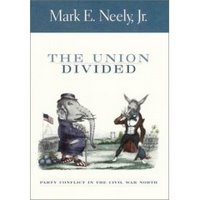 Just read the 2005 paperback edition of Mark Neely's 2002 The Union Divided and figured out how to earn a big fat Amazon sales rank of "#1,468,736 in Books." (Is that the lowest Amazon rank ever awarded?)
Just read the 2005 paperback edition of Mark Neely's 2002 The Union Divided and figured out how to earn a big fat Amazon sales rank of "#1,468,736 in Books." (Is that the lowest Amazon rank ever awarded?) Here's how: buck the tide of Centennial happyfaces fresh from their Ken Burns DVDs. Ergo:
(1) Argue that the two party system hindered the Union war effort.
(2) Use the writings of James McPherson as examples of getting-it-wrong.*
(3) Point out that it is very hard to connect the president or the Republican Congress with anything remotely resembling "modern war." Underscore that the Republican concept of war was a throwback.
(4) Note that the press had a detrimental effect on the public's understanding of military affairs and events througout the war, particularly the Republican press.
(5) Observe that the Civil War years politically represented a regression to the early republic when political opposition was equated with sedition.
(6) Deplore that the political history of the war has been "sadly neglected."
Here are some quotes to designed to reap trouble:
... the Republican political victory in 1864 buried for a century the military lessons of the Civil War.Oh dear. The Republican interpretation of the war, civil and military, is all we have had for 140+ years. More trouble ahead:
To survey what historians of northern politics have said on the subject [of two Union parties] over the last generation is to discover a glacial unanimity that has virtually frozen scholarship and fresh investigation of the subject.I think I know that glacier.
And if you think that a generation of glacial unanimity surgically froze out your own new thinking on party politics during the war you are making the same error that Steve Newton made when he decided that the Centennial accounting of the war in the east was correct except for its treatment of Joe Johnston.
Look beyond your single issues to behold the wholeness of that ice sheet my friends. Then grab your icepicks.
More on this book later in the week.
***
(* A Pulitzer winner using McPherson's stuff as an example of nonsense - see p. 180 - indeed, the times, they are a changin!)



